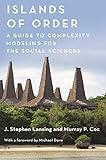Islands of Order : A Guide to Complexity Modeling for the Social Sciences / Murray P. Cox, J. Stephen Lansing.
Material type: TextSeries: Princeton Studies in Complexity ; 33Publisher: Princeton, NJ : Princeton University Press, [2019]Copyright date: ©2019Description: 1 online resource (248 p.) : 64 b/w illus. 8 tables. 6 mapsContent type:
TextSeries: Princeton Studies in Complexity ; 33Publisher: Princeton, NJ : Princeton University Press, [2019]Copyright date: ©2019Description: 1 online resource (248 p.) : 64 b/w illus. 8 tables. 6 mapsContent type: - 9780691192949
- 9780691197531
- 301 23
- HM706 .L35 2019
- online - DeGruyter
- Issued also in print.
| Item type | Current library | Call number | URL | Status | Notes | Barcode | |
|---|---|---|---|---|---|---|---|
 eBook
eBook
|
Biblioteca "Angelicum" Pont. Univ. S.Tommaso d'Aquino Nuvola online | online - DeGruyter (Browse shelf(Opens below)) | Online access | Not for loan (Accesso limitato) | Accesso per gli utenti autorizzati / Access for authorized users | (dgr)9780691197531 |
Browsing Biblioteca "Angelicum" Pont. Univ. S.Tommaso d'Aquino shelves, Shelving location: Nuvola online Close shelf browser (Hides shelf browser)

|

|

|

|

|

|

|
||
| online - DeGruyter Utopophobia : On the Limits (If Any) of Political Philosophy / | online - DeGruyter Martyrs and Tricksters : An Ethnography of the Egyptian Revolution / | online - DeGruyter Hydropolitics : The Itaipu Dam, Sovereignty, and the Engineering of Modern South America / | online - DeGruyter Islands of Order : A Guide to Complexity Modeling for the Social Sciences / | online - DeGruyter In Search of the Soul : A Philosophical Essay / | online - DeGruyter Humanism and Scholasticism in Late Medieval Germany / | online - DeGruyter For Self-Examination and Judge for Yourselves! / |
Frontmatter -- CONTENTS -- FIGURES -- TABLES -- FOREWORD. The Malay Archipelago Revisited -- PREFACE -- CHAPTER 1. Models of Change -- CHAPTER 3. Dominance, Selection, and Neutrality -- CHAPTER 4. Language and Kinship in Deep Time -- CHAPTER 5. Islands of Cooperation -- CHAPTER 6. Adaptive Self-Organized Criticality -- CHAPTER 7. Transition Paths -- CHAPTER 8. From the Other Shore -- APPENDIX A. Correlation Functions -- APPENDIX B. Game and Lattice Models -- APPENDIX C. Intra- and Intersubak Coordination of Irrigation -- APPENDIX D. Fisher Information -- APPENDIX E. Energy Landscape Analysis -- APPENDIX F. Survey Questions Used in Chapter 7 -- INDEX
restricted access online access with authorization star
http://purl.org/coar/access_right/c_16ec
Over the past two decades, anthropologist J. Stephen Lansing and geneticist Murray Cox have explored dozens of villages on the islands of the Malay Archipelago, combining ethnographic research with research into genetic and linguistic markers to shed light on how these societies change over time. Islands of Order draws on their pioneering fieldwork to show how the science of complexity can be used to better understand unstable dynamics in culture, language, cooperation, and the emergence of hierarchies.Complexity science has opened exciting new vistas in physics and biology, but poses challenges for social scientists. What triggers fundamental, discontinuous social change? And what brings stable patterns-islands of order-into existence? Lansing and Cox begin with an incisive and accessible introduction to models of change, from simple random drift to coupled interactions, phase transitions, co-phylogenies, and adaptive landscapes. Then they take readers on a series of journeys to the islands of the Indo-Pacific to demonstrate how social scientists can harness these powerful tools to discover out-of-equilibrium social dynamics. Lansing and Cox address empirical questions surrounding the colonization of the Pacific, the relationship of language to culture, the emergence and disappearance of male and female hierarchies, and more.Unlocking new possibilities for the social sciences, Islands of Order is accompanied by an interactive companion website that enables readers to explore the models described in the book.
Issued also in print.
Mode of access: Internet via World Wide Web.
In English.
Description based on online resource; title from PDF title page (publisher's Web site, viewed 21. Jun 2021)


